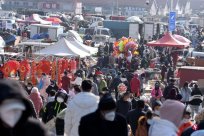
December the factors that lead to the decline in the comprehensive index are the accelerated contraction of the total amount of new orders.At the same time, the demand for Chinese manufacturing products has declined, and the speed of speed has increased from November.Enterprises report that decreased exports are generally due to global economic downturn and epidemic affairs.
The relaxation of the Chinese epidemic prevention and control policy has increased the number of crown diseases, and the short -term impact on the national economy has appeared.It is the lowest in the past three months, but the optimism of companies in the future of production in the next year has risen, the highest in 10 months.
According to Caixin.com, Caixin Media and Research Company Markit jointly announced December Caixin China Manufacturing PMI below November 0.4 points, which is lower than the Rongku Line for the fifth consecutive month, and the decline has expanded.
The previous November value was 49.4, which has been picked up from October, but it is a critical point below 50 for four consecutive months.
This trend is consistent with the official manufacturing PMI.The PMI of the manufacturing industry in December 2022 announced by the National Bureau of Statistics of China was 47, a decrease of 1 point, the lowest since March 2020.
December the factors that lead to the decline in the comprehensive index are the accelerated contraction of the new orders. Although the sales have been small, it has been the most significant in the past three months. Enterprises have reflected the sustainable epidemic and their demand is relatively weak.
At the same time, the demand for Chinese manufacturing products in overseas markets has also declined, and the speed of speed has increased from November.Enterprises report that decreased exports are generally due to global economic downturn and epidemic affairs.
Corporate optimism has the highest since February last year
It is encouraging that in December, companies' confidence in the future of production in the next year has increased, and its optimism has risen to the highest since February 2022. Enterprises generally expect that the output will increase with the improvement of the epidemic and the improvement of the market conditions.
Wang Yan, a senior economist of Caixin Think Tank, said that the crown disease epidemic spread across the country in December.Profit pressure, procurement and inventory are at a low level. However, benefiting from the further optimization and implementation of the prevention and control measures of the crown disease epidemic, optimism of manufacturing enterprises has been significantly improved.
A report released by China Blood Book International (CBBI) on Monday (January 2), a private research institution studying the Chinese economy, stated that due to the outbreak of the crown disease, China's manufacturing, service industry and real estate industry were in 2022 in 2022The continued decline in the fourth quarter of the year may cause the overall economy to shrink in the last few months of last year.
According to Bloomberg, CBBI issued a report after investigation of 4,354 companies in the previous quarter stating that the profit, sales and employment index of manufacturing and service industry enterprises were measured. In the last three months of 2022, compared with the previous quarter and the previous quarter,A year ago, it fell, of which the real estate industry indicators, including transaction volume and price, fell to the lowest level in history.
CBBI wrote in its report that these data show that the actual domestic GDP (GDP) in China in the fourth quarter may shrink year -on -year, and only increased by 2%in 2022.
CBBI chief economist Derek Scissors believes that after the Chinese government abandon the clearing policy, although the market expects that the Chinese economy will show a strong recovery in 2023, as the wave of crown disease infection continues, investment has fallen to 10 to 10New lows since the quarter, new orders have continued to be pressured, and the meaningful recovery in the first quarter was "increasingly unrealistic".



